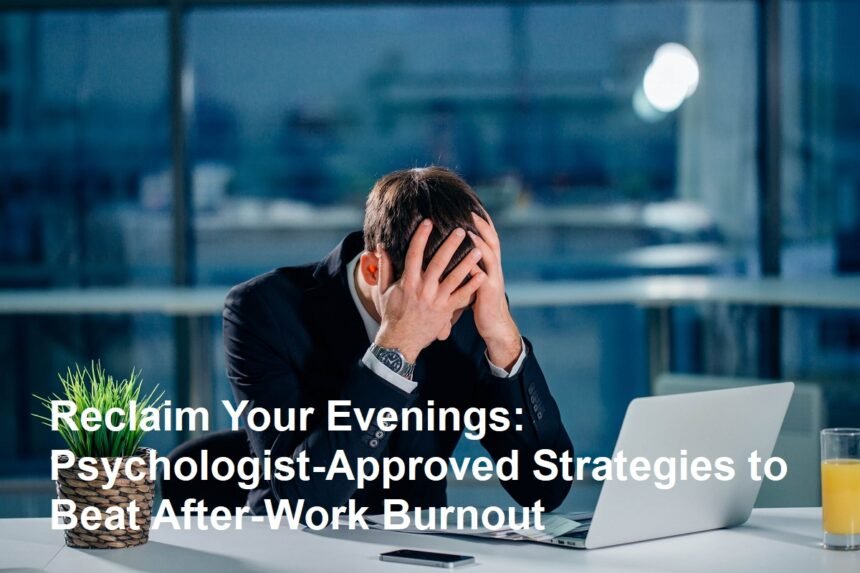Feeling emotionally drained, cynical, and utterly exhausted the moment you step through the door? Work burnout doesn’t end at 5 PM – it hijacks your personal life. Psychologists emphasize that combating this requires intentional rituals and mindset shifts. Here’s how to create a protective buffer between work stress and your precious downtime:
1. Craft a “Commute Ritual” (The Mental Airlock)
Why it works: Transition rituals signal your brain to switch modes.
- Action:
- Listen to an engaging podcast/audiobook (non-work related).
- Practice 5 minutes of mindful breathing before leaving your car/desk.
- Change clothes immediately upon arriving home (symbolic shedding of work identity).
Psychologist Insight:“This isn’t frivolous – it’s neurological boundary-setting,” says Dr. Lena Rossi.
2. Master the “Power Down Protocol”
Why it works: Constant digital tethering perpetuates stress hormones.
- Action:
- Turn off work email/slack notifications on your phone after hours.
- Charge devices outside the bedroom.
- Use app blockers (e.g., Freedom, Forest) if self-control fails.
Psychologist Warning:“Blue light from screens suppresses melatonin. Protect your sleep like it’s your job.” – Dr. Marcus Chen.
3. Schedule Micro-Recovery Activities (Not Scrolling!)
Why it works: Burnout depletes emotional resources; passive scrolling worsens it.
- Evidence-Based Replacements:
- 20-Minute Rule:Engage in one replenishing activity within 20 mins of arriving home:
- Light stretching/yoga
- Watering plants
- Pet interaction (lowers cortisol)
- Cooking a simple meal
- Sensory Reset:Splash cold water on your face, diffuse calming scents (lavender, cedarwood).
- 20-Minute Rule:Engage in one replenishing activity within 20 mins of arriving home:
4. Practice “Venting with Purpose” (Then Release)
Why it works: Processing frustration is healthy; rumination is toxic.
- Structured Approach:
- Set a 10-minute timer to vent to a partner/friend/journal.
- End with: “What’s one small thing I can control tonight?”
- Shift focus to a non-work topic immediately after.
Psychologist Tip:“Verbalizing stress activates the prefrontal cortex, helping regain control. But endless complaining traps you in victimhood.” – Dr. Anita Desai.
5. Redefine “Productivity” in Personal Time
Why it works: Burnout sufferers often feel guilty for resting.
- Cognitive Reframe:
- Replace “I shouldclean/gym/errands” with “Rest is productive recovery.”
- Give yourself permission to do nothing without guilt 2 nights/week.
- Ask: “What would feel nourishing right now?” (Not “What needs doing?”)
6. Leverage Nature’s Reset Button
Science-Backed: Just 15 mins outdoors lowers stress hormones.
- Post-Work Options:
- Walk barefoot in grass (“grounding”).
- Sit on a balcony/patio with herbal tea.
- Open windows for fresh air while cooking.
Critical Boundaries Often Missed
- The “No Problem-Solving” Rule:Ban work talk during dinner/family time.
- Weekend Protection:Schedule one full day with zero work tasks/emails.
- Physical Workspace Separation:If WFH, hide work devices after hours.
When to Seek Professional Help (Per APA Guidelines)
If after 4 weeks of consistent effort, you experience:
- Persistent insomnia or exhaustion
- Emotional numbness/detachment
- Physical symptoms (headaches, GI issues)
- Inability to derive joy from non-work activities
→ Consult a therapist specializing in burnout/cognitive behavioral therapy (CBT).
The Core Principle: Burnout recovery starts before the weekend. Your evenings are sacred soil – plant rituals that nurture resilience, not resentment. Small, consistent acts of boundary-setting rebuild your emotional reserves far more effectively than crash-resting on weekends.












